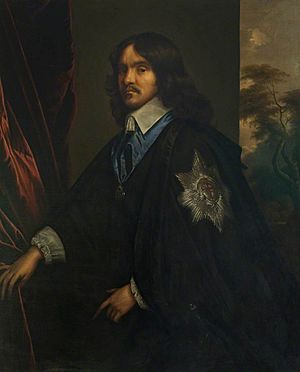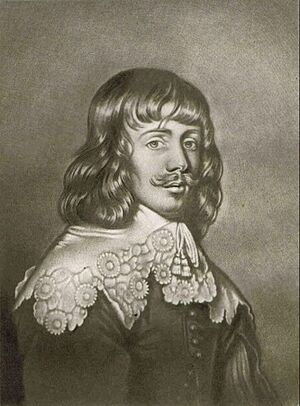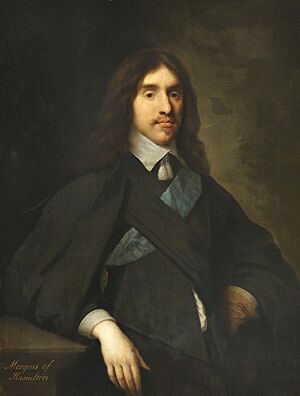William Hamilton, 2nd Duke of Hamilton facts for kids
Quick facts for kids
The Duke of Hamilton
|
|
|---|---|

after Adriaen Hanneman, 1625–1650
|
|
| Predecessor | James Hamilton, 1st Duke of Hamilton |
| Successor | Anne Hamilton, 3rd Duchess of Hamilton |
| Other titles | Earl of Lanark, Earl of Cambridge, Lord Machanshyre, Lord Polmont |
| Born | 14 December 1616 Hamilton, South Lanarkshire |
| Died | 12 September 1651 (aged 34) The Commandery, Worcester |
| Buried | Worcester Cathedral |
| Noble family | Hamilton |
| Spouse(s) | Lady Elizabeth Maxwell |
| Issue |
|
| Father | James Hamilton, 2nd Marquess of Hamilton |
| Mother | Lady Ann Cunningham |
William Hamilton, the 2nd Duke of Hamilton, was an important Scottish nobleman. He lived from 1616 to 1651. He played a big part in the Wars of the Three Kingdoms. These wars were a series of conflicts across Scotland, England, and Ireland. He supported both the Royalists and the Presbyterians during this time.
Contents
Early Life and Education
William Hamilton was born in December 1616. His birthplace was Hamilton Palace in Scotland. His father was James Hamilton, 2nd Marquess of Hamilton. His mother was Lady Ann Cunningham.
He went to the University of Glasgow for his education. After university, he traveled around Continental Europe. He even spent time at the court of King Louis XIII in France. When he was 21, he became a favorite of King Charles I in London.
Political Career and Titles
In 1639, William Hamilton received new titles. He became the Earl of Lanark, Lord Machanshyre, and Polmont. These were titles in the Scottish nobility. In 1640, he was elected to Parliament in England. He represented the town of Portsmouth. He also became the Secretary of State for Scotland. This was a very important government job.
Challenges and Arrest
In 1643, King Charles I ordered his arrest. The King suspected him of working with his brother. William managed to escape. For a while, he worked with the Presbyterian group.
He later took part in the Battle of Kilsyth. This battle was fought on the side of the Covenanters. The Covenanters were Scots who supported the Presbyterian Church.
Working with King Charles I
In 1646, the Scottish Parliament sent him to meet King Charles I. They wanted him to convince the King to accept Presbyterianism in England. He tried his best but was not successful.
In 1647, he signed a special agreement with King Charles. This agreement was called the "Engagement." It was signed at Carisbrooke Castle. He then helped to plan the Second English Civil War.
Becoming Duke of Hamilton
In 1648, William Hamilton went to Holland. He joined the Prince of Wales, Charles II, who was in exile there. The next year, his brother was executed. This meant William became the Duke of Hamilton. He also gained other important titles. This made him the most senior Scottish Royalist in exile.
In 1650, he received the Order of the Garter. This is a very special award for knights. He returned to Scotland with King Charles II in 1650. He chose not to cause problems for the King.
Military Role and Death
William Hamilton went to his estates on the Isle of Arran. Later, Scotland invaded England during the Third English Civil War. He became a colonel in the army. He led a group of soldiers from his own lands.
He was badly wounded at the Battle of Worcester. This battle was fought in 1651. He died from his wounds at The Commandery in Worcester. This was King Charles II's headquarters. A street nearby, Hamilton Road, is named after him.
Family Life
William Hamilton married Lady Elizabeth Maxwell in 1638. They had several children together:
- James Hamilton, Lord Polmont (who died as a baby).
- Lady Anne Hamilton.
- Lady Elizabeth Hamilton.
- Lady Mary Hamilton.
- Lady Margaret Hamilton.
- Lady Diana Hamilton (who also died as a baby).
William Hamilton had no sons who lived to inherit his titles. So, after he died, his oldest niece, Anne Hamilton, 3rd Duchess of Hamilton, became the Duchess of Hamilton.
In Literature
William Hamilton is shown as a character in a series of books. These books are called the Montrose trilogy by Nigel Tranter. The story in the books is not completely true to history.
 | Emma Amos |
 | Edward Mitchell Bannister |
 | Larry D. Alexander |
 | Ernie Barnes |



